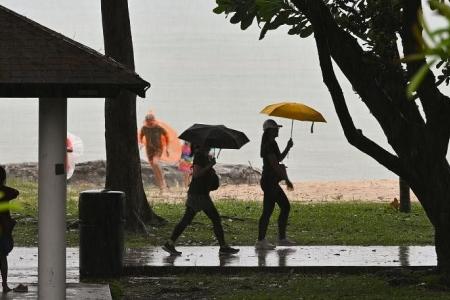Highest number of dengue cases in over a year, but recent heavy rains may see fall in cases
Dengue infections have been going up for six consecutive weeks, with 396 cases reported in the week of Jan 7 to 13 – the highest weekly figure in more than a year. Six weeks ago, there were just 143 cases.
While this is a far cry from the 1,552 cases a week at the peak of the infection in 2022, the steady increase in cases has the National Environment Ministry urging people “living in dengue cluster areas to take immediate action to suppress the Aedes mosquito population and help break disease transmission”.
It also asked them to cooperate with National Environment Agency (NEA) officers inspecting their property for mosquito larvae.
There were almost 10,000 dengue cases reported last year, down from the 32,000-plus cases in 2022. The largest number of this Aedes mosquito-borne viral infection seen here was in 2020, when there were 35,315 cases, and 32 deaths.
Dengue caused three deaths here in the first nine months of 2023. The previous year, 19 people died.
However, experts say the recent heavy rains could lead to a drop in dengue cases.
“The general trend is for dengue cases to dip after heavy rainfall and this dip can go on for as much as six weeks,” said Professor Hsu Li Yang, an infectious diseases expert and vice-dean for global health at the NUS Saw Swee Hock School of Public Health.
While wet weather resulting in standing water increases mosquito breeding, heavy rains causes a “flushing effect” where the larvae is washed away, killing most of them.
The experts are also not overly worried about the two changes in the dominant dengue serotype last year, although they warn that a second infection could prove more serious.
There are four dengue serotypes. DEN-3, the dominant strain behind the bulk of infections in 2021 and 2022, was overtaken by DEN-1 in June 2023, and later DEN-2 in September.
People do not get reinfected by the virus from the same serotype, but can be infected by the other three strains.
Symptoms of dengue include a sudden onset of fever, headache, muscular and joint aches, nausea and vomiting. Anyone with such symptoms should see a doctor to prevent the infection from taking on a more severe form, such as dengue haemorrhagic fever or dengue shock syndrome.
There are currently 80 active dengue clusters of which 17 have 10 or more cases. The biggest cluster in the Boon Lay-Corporation Road-Jurong West area has recorded 200 cases, of which 48 were within the past fortnight.
The NEA said it had observed a “fast rate of dengue transmission” in this cluster, as well as two at Pair Ris and one at Jalan Chegar at Upper Thomson.
It urged people to use insect repellent to protect themselves from being bitten by the Aedes mosquito.
Anyone diagnosed with or suspected to have dengue are also advised to avoid further mosquito bites, to prevent passing on the dengue virus to mosquitoes and other people in their neighbourhood, NEA added.
Get The New Paper on your phone with the free TNP app. Download from the Apple App Store or Google Play Store now

